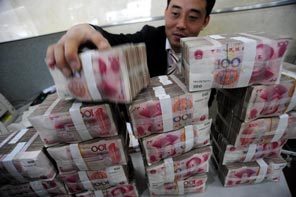China to increase float of currency
Facing growing worldwide pressure, China's central bank said Saturday it is prepared to allow the country's currency to float more freely against the dollar and other foreign currencies.
The Washington Post

A bank clerk stacks up renminbi bank notes in central China's Anhui province in this 2009 photo.
The statement, from a bank spokesman, gave no details of when China would allow its currency — known as the renminbi or yuan — to appreciate and by how much. But the timing of its release, just before the leaders of the world's largest economies gather for a G-20 meeting in Toronto, appeared aimed at taking pressure off China about the issue.
Many countries, including the United States, have criticized China's fixed exchange rate, which critics say keeps the value of Chinese exports artificially low.
The bank spokesman said the fixed rate had helped China weather the global financial meltdown that started in 2008.
"The stability of the (renminbi) exchange rate has played an important role in mitigating the impact of the crisis, contributing significantly to Asian and global recovery, and demonstrating China's efforts in promoting global rebalancing," the spokesman said, according to the Xinhua news agency.
But now, the spokesman said, the global economy has recovered enough, and China's own economic growth appears solid enough, to allow more flexibility.
The move was immediately welcomed by the Obama administration, which said it was a vindication of President Obama's policy to try to quietly negotiate over the exchange rate.
Obama said "China's decision to increase the flexibility of its exchange rate is a constructive step that can help safeguard the recovery and contribute to a more balanced global economy."
The European Commission also welcomed the decision, saying it would help achieve more sustainable global economic growth, reduce trade imbalances and strengthen the global financial system.
But critics remained skeptical, noting China has sent signals before about a currency appreciation — usually ahead of an international meeting or deadline — but failed to follow through. The most recent example came in April, when senior Chinese officials said the eve of President Hu Jintao's visit to Washington for a nuclear-security summit that it was time to allow the more flexibility in the currency.
Hu attended the summit, and the currency was left unchanged.
Sen. Charles Schumer, D-N.Y., one of the lawmakers pushing for punitive sanctions against China over the currency issue, said, "Until there is more specific information about how quickly it will let its currency appreciate and by how much, we can have no good feeling that the Chinese will start playing by the rules."
Signs that a global economic recovery has taken hold prompted speculation that China would begin letting the yuan resume a gradual appreciation against the U.S. dollar that began in 2005 but was halted in 2008 as the global financial crisis took effect.
Since then, the yuan's value has remained at roughly 6.83 to $1, although it is formally pegged to a basket of currencies that includes the U.S. dollar.
China has been reluctant to change its currency, with the leadership often appearing divided and making conflicting public statements.
Among other things, Chinese officials expressed concern about the effect a currency appreciation would have on its crucial export sector and its many small factories, particularly in the southern manufacturing hub of Guangdong province, which has been hit by a wave of labor unrest as workers demand higher wages.
China's central bank, which is responsible for buying and selling world currencies and thus regulating the renminbi's value, is thought to have long favored more flexibility.
But the Commerce Ministry, which represents the country's many small exporters, has opposed any currency change.
The impact of a currency appreciation on markets, and in particular on the United States, will depend on how far and how fast China allows the renminbi to fluctuate over time, analysts say.
The country is expected to guard against any sudden swings, and movements in other world currencies such as the euro could mute any advantage to U.S. exporters.
"The big question is whether this is a symbolic move or a true shift," said Eswar Prasad, a Cornell University economist.
Material from The Associated Press is included in this report.
Copyright © 2010 The Seattle Times Company To subscribe or visit go to: http://seattletimes.nwsource.com